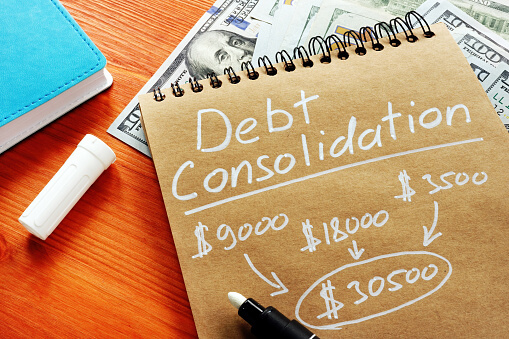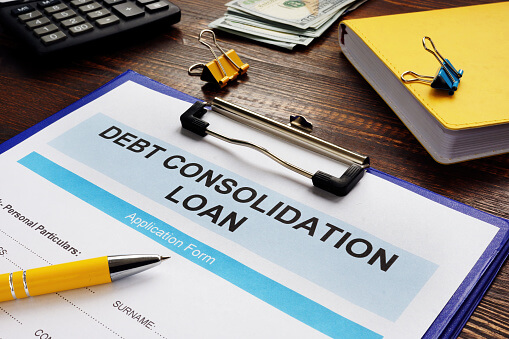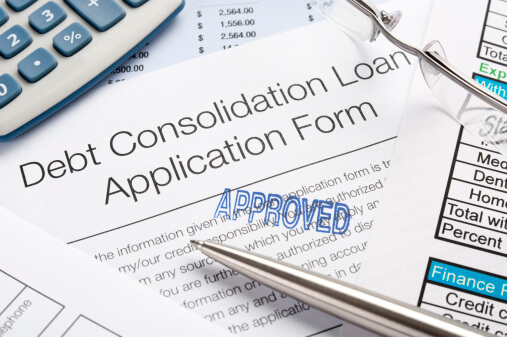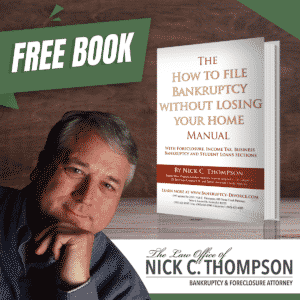A solution gets you closer to your goal or farther away. Bankruptcy gets you closer to being debt-free than a debt consolidation loan that gets you more into debt and often risks your home, especially when dealing with overwhelming credit card debt. Most people ignore warning signs that they may be in financial trouble and overlook possible solutions. You have several options. Debt settlement vs debt consolidation and bankruptcy vs. Debt Consolidation loan- which is better?
In most cases, when people realize they have debt, they panic and attempt to work with a debt settlement company or a debt consolidation company to eliminate their debt. Filing for Chapter 7 Bankruptcy or Chapter 13 Bankruptcy in Louisville, Kentucky, is often much better for various reasons. This article will focus on several aspects of how you should react and what the options are for you.

Debt Restructuring vs. Bankruptcy vs. Debt Consolidation
Debt settlement companies will often describe their services as debt settlement or debt consolidation. Many individuals facing financial difficulties often struggle with credit card debt, which can be addressed through various methods such as debt restructuring, bankruptcy, or debt consolidation. One key aspect to consider is the monthly payment, which can be more manageable with bankruptcy than debt consolidation. It gets confusing.
Debt Consolidation Loans
An unsecured debt consolidation loan often requires paying a higher interest rate. Or it requires collateral. The security debt consolidation loans usually require a second mortgage or home equity loan, often at a lower interest rate. But, debt consolidation places your home at risk by using it as security. You are not getting rid of debt; you only converted unsecured debt into your worst enemy, secured debt. You trade unsecured debt you could have discharged in bankruptcy for a secured debt you may not be able to afford, which will cause you to lose a home. If you can’t afford the debt, bankruptcy is often the solution. Many people turn to debt consolidation loans to manage their credit card debt, but this can lead to converting unsecured debt into secured debt, which carries its own risks. The person talking you into the loan makes a commission from debt consolidation work.
Debt Settlement as an Option!
Debt settlement plans fail over 90% of the time if they are done over time. Consulting a credit counselor may help you explore options and create a debt management plan tailored to your situation. However, never withdraw your retirement. That sacrifices an asset you can’t get back to pay off unsecured debt, which you often could have wiped out in bankruptcy for about 2000 dollars. Your primary duty is to yourself and your family. Your duty does not involve making a debt settlement company or your creditors rich by sacrificing assets your family needs today or in the future.
The Chapter 7 bankruptcy process removes unsecured debt and typically pays back zero to creditors. A Chapter 13 repayment plan will normally pay the unsecured debt off for a much lower percentage than a debt consolidation agreement with a nonprofit credit counseling agency. Often, a nonprofit credit counseling agency is owned by a bank. You rarely get advice from credit counseling or debt relief agencies that will cost the lender.
Bankruptcy as an Option!
In 2024, federal exemptions allow you to keep about 25,000 in equity in a home. Bankruptcy discharges unsecured debts, such as credit card debt and medical bills, providing significant financial relief.
These exemptions increase over time, usually twice a year for bankruptcy. The last time the state exemption was increased was in the 1990s. Because bankruptcy allows you to keep more property, it is almost always better than what the IRS or banks demand in a debt settlement or a debt management plan.
Debt Consolidation vs. Bankruptcy: Which is Better?
With a Debt settlement company or debt consolidation, you continue to be liable for the debt, and they can have tax consequences for any gain. Both debt consolidation and bankruptcy can be used to manage credit card debt, but they have different implications for your financial future. Both debt consolidation and bankruptcy can significantly affect your credit reports, which should be carefully considered. Chapter 13 will also restructure, consolidate, and settle debts by paying back loans over time. You can pay off creditors with a 3-year plan if you have less than the average income.
If you have more than the average income for your size family, you must use a 5-year plan. Secured debts you are keeping, like a home mortgage or car loan, are caught up. Unsecured debt is paid back what your family can afford in Chapter 13. In Chapter 7, they are almost always paid back zero.
Debt Settlement vs. Bankruptcy vs. Debt Consolidation Loan a Partial Checklist
How Bankruptcy ends up being superior to debt management plans, debt settlement, or restructuring is that with Bankruptcy:
- Your credit is immediately improved. Being overdue on debts is replaced with comments showing the account is closed. Obtaining a loan from a bank or credit union can be a viable option for debt consolidation, but it comes with its own set of risks and benefits.
- You pay back less to credit cards and unsecured debt in Chapter 7 or 13 than in other methods, making it an effective solution for managing credit card debt.
- You have a much better chance of success in paying off a Chapter 7 or Chapter 13 bankruptcy because a debt settlement company has over a 90% chance of failure, according to NACBA and the CFPB. The success ratio of completing a Chapter 7 in our office is about 99%. The success ratio nationwide of Chapter 13 is about 40%.
- Debt consolidation loans hurt your credit because your debt to income-ratios increases.
- A Bankruptcy attorney offers professional advice. About half the time, the bankruptcy attorney is also a CPA or he is a lawyer with an advanced degree in accounting finance or tax law. Usually, the person offering you a debt consolidation loan makes a commission from the loan and has no accounting degree.
Debt Consolidation Loan vs. Bankruptcy
Your credit report and credit scores are important. Credit unions often offer debt consolidation loans with favorable terms, which can be used to manage credit card debt, but it’s essential to understand the potential impact on your credit this has. There are many ways to fail in a repayment plan. I will grant that mentally, if you consolidate debt, it is easier to keep track of one payment instead of nine.
However, how does debt consolidation affect credit?
Generally, paying back debt on time and in full lowers your credit score. Consolidation loans pay off debts you have had for a long time for new debt, lowering your credit report score. When you consolidate debt, you usually increase the gross amount of your debt. It may make a person feel good that they pay creditors back in full, but this could have been done in a Chapter 13 bankruptcy with a 100% plan that repaid no interest rate on the debt.
With both Bankruptcy and debt consolidation loans, you are debt-free within 3 to 5 years. So what is the difference? Why choose Bankruptcy?
Chapter 13 Bankruptcy vs. Debt Settlement Companies
A debt management plan does not include credit counseling and often targets credit card debt, which can be repaid over time. You make debt payments over time. The debt consolidation companies take a portion of that payment for themselves, and debt is repaid at about 60-70% of the amount owed.
Chapter 13 will repay unsecured creditors, often at less than 50%. A Chapter 13 plan will not be approved and confirmed unless it is feasible (affordable). With debt settlement companies, as long as you pay, it will be approved whether or not you can afford it. In a Chapter 13 bankruptcy, almost all debts can be included. Child support, student loans, and even priority income taxes under three years old can be repaid over time and caught up or discharged.
Debt settlement cannot force creditors to take what you offer. No law says creditors must agree with your debt settlement offer. With bankruptcy, you have the power of a court order from a federal judge forcing the creditors to take the payments and the Chapter 13 plan the court approves.
With a Chapter 13 bankruptcy, you can even strip and remove a second mortgage that has no equity in the home. Try getting a second mortgage to take 10% of what you owe in exchange for their mortgage when they have no equity in the home equity loan. It isn’t happening. However, in a Chapter 13 bankruptcy, you can force it.
Chapter 7 Bankruptcy vs. Debt Settlement Companies
Chapter 7 has less ability to force conditions on a creditor than a Chapter 13 bankruptcy. However, it can effectively discharge unsecured debts, such as credit card debt and medical bills, providing significant financial relief. But nothing increases your net worth faster and cheaper than Chapter 7.
Bankruptcy also increases your credit score for most people with a 600-700 credit score or less. Delinquent remarks on your credit report are removed. It takes about 2000 dollars and about 10 hours of your time to eliminate all of your unsecured debt in Chapter 7. That is why the wealthy often use it as a financial tool.
Most people will keep their secured home and car loans in Chapter 7. Chapter 7 does not usually eliminate income taxes less than three years old, child support, alimony, and student loans. However, sometimes, it has eliminated those debts when there is a perfect storm and conditions are right.
Suppose you have 100,000 of credit card and medical bills. In that case, you can file bankruptcy and often walk out of bankruptcy court 100,000 dollars richer for 10 hours of work supplying documents and preparing a bankruptcy petition with your attorney.
When did you last spend 10 hours working and 2000 dollars and make 10,000 or more per hour from filing bankruptcy? It happens in our office each month. You must prove you do not have enough income and little or no net assets to pay your necessary expenses. It happens all the time to people who own a business.
Contact Our Law Office if You Want Debt Settlement or Debt Consolidation!
If you have a slight problem like a small credit card that has filed a lawsuit to collect and less than 10,000 in debt, you may want to save your ability to file bankruptcy. If you have a slight problem like a small credit card debt that has filed a lawsuit to collect and less than 10,000 in debt, you may want to save your ability to file bankruptcy. A balance transfer credit card can be useful for managing small debts, often offering a no- or low-interest introductory period. The right to file bankruptcy is valuable if you owe 10,000 to millions in debt. You usually don’t want to use a bankruptcy when debt settlement makes more sense.
Debt relief with a debt consolidation program or personal loan is reasonable if all you owe in existing debts is a small amount. A little belt-tightening and saving up to pay it off is the proper decision when all you owe is 10,000 or less.
Resources for Bankruptcy
Louisville, Kentucky Bankruptcy Forms
Benefits of a Chapter 7 Bankruptcy • Video
What is the Student Loan Brunner Test?
Filing Chapter 7 & Chapter 13 Bankruptcy
Student Loan Bankruptcy Qualifications
Chapter 11 Business Bankruptcy Information
If you are considering bankruptcy, don’t delay because timing is crucial. I am here to help you. So, contact my office immediately to start the conversation—Nick C. Thompson, Bankruptcy Lawyer: 502-625-0905.








